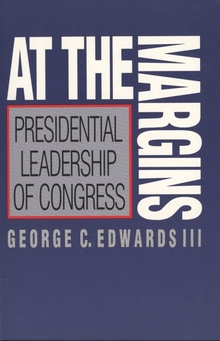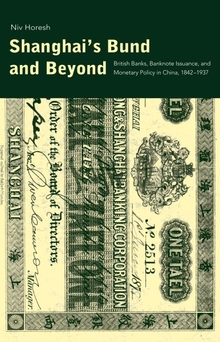At the Margins
WARNING
You are viewing an older version of the Yalebooks website. Please visit out new website with more updated information and a better user experience: https://www.yalebooks.com
Presidential Leadership of Congress
George C. Edwards III
In this book George Edwards seeks a deeper understanding of the relationship between the president and Congress, exploring how and under what conditions presidents lead Congress, what we can reasonably expect of them, and how we should evaluate their performance. He makes a persuasive case for his thesis that presidential leadership of Congress is typically at the margins, not the core, of policymaking.
Edwards focuses on three important resources for presidential leadership: party, public opinion, and legislative skills. For each source of influence he analyzes the president's strategic position, the theoretical potential of the resource as an instrument of leadership. He then examines presidents' attempts to employ each resource to obtain support in Congress, showing that they are rarely able to expand their resource base or manipulate their resources reliably.
Integrating quantitative analysis with documentary and historical research, Edwards argues that the effective leader is not the dominant chief executive of political folklore who restructures the contours of the political landscape to pave the way for change but is rather a facilitator who works at the margins of coalition building to exploit opportunities presented by a favorable configuration of political forces in his environment.
Presidents are not by themselves going to bring about major changes in public policy, says Edwards, and we must adjust accordingly our expectations of their leadership. The implications of his book are broad, and his findings are an important corrective for those who personalize politics and attribute more influence to a single person or strategy than is usually merited.
"An impressive survey of presidential-congressional relations and will likely stand as a point of reference for anyone who wants to understand this area. . . . For those who want to understand presidential relations with Congress, Edwards breaks new ground. But he does not stop there. . . . At the Margins will serve as the basis for reevaluating our understanding of presidential-congressional relations. It will also provide a variety of readers a lesson in good scholarship. Few books do as much."—Ryan J. Barilleaux, Presidential Studies Quarterly
"This is one of the most important books on the American presidency since the publication of Richard Neustadt’s classic Presidential Power."—Norman Thomas, Governance
"An impressive survey of presidential-congressional relations and will likely stand as a point of reference for anyone who wants to understand this area. . . . At the Margins will serve as the basis for reevaluating our understanding of presidential-congressional relations. It will also provide a variety of readers a lesson in good scholarship. Few books do as much."—Ryan Barilleaux, Presidential Studies Quarterly
"Edwards has provided a definitive, virtually encyclopedic guide to congressional roll calls on the presidential program, one of the most important contributions of this book. . . . If presidential leadership is marginal, Edwards’ arguments and data are central to understanding why."—Richard M. Pious, Journal of Politics
"Edwards has written a book that deserves to be read and debated. Edwards’ book makes a major contribution to the study of executive-legislative relations in that it both summarizes what has been learned in previous studies and adds new comparative evidence concerning what determines the success or failure of presidential leadership over Congress."—John W. Sloan, Social Science Quarterly
"[An] ambitious and successful attempt to measure presidential effectiveness in Congress."—G. Bingham Powell, Jr., Political Science Quarterly
"This is an interesting book, which is very useful in understanding the presidency."—Legislative Information Alert
"A solid and provocative work that smacks down a lot of conventional ’wisdom’. . . . A notable contribution to the literature and is strongly recommended for scholars and graduate students interested in this area."—Robert E. Dewhirst, Perspective
"This is George Edwards’ most ambitious and successful attempt to measure presidential effectiveness in Congress. . . . A significant, quantitative analysis of presidential-congressional relations. It presents much evidence and argumentation against overpersonalizing explanations of presidential influence. . . . It is an excellent study, must reading for presidency and Congress students, a major contribution to the literature."—Stephen J. Wayne, Political Science Quarterly
"Historians will find this a valuable study. The book is well written and free of jargon. The quantitative work is presented in a clear, straightforward manner that can be easily understood, and the author’s sensitivity to change over time adds a distinctly historical dimension to his analysis."—Gary M. Fink, Journal of American History
"George Edwards has written an important book on the conditions associated with presidential influence in Congress. His concept of strategic position not only provides unity for this book, but it offers a basis for comparative analysis of presidents, past and future. Political scholars and practitioners will welcome the publication of At the Margins."—Charles O. Jones, University of Wisconsin-Madison
"A significant contribution to the study of presidential-congressional relationships. This important book should be read by every serious student of the presidency and Congress."—Stephen J. Wayne, George Washington University
ISBN: 9780300048995
Publication Date: July 25, 1990
Publication Date: July 25, 1990
247 pages, 6 1/8 x 9 1/4










